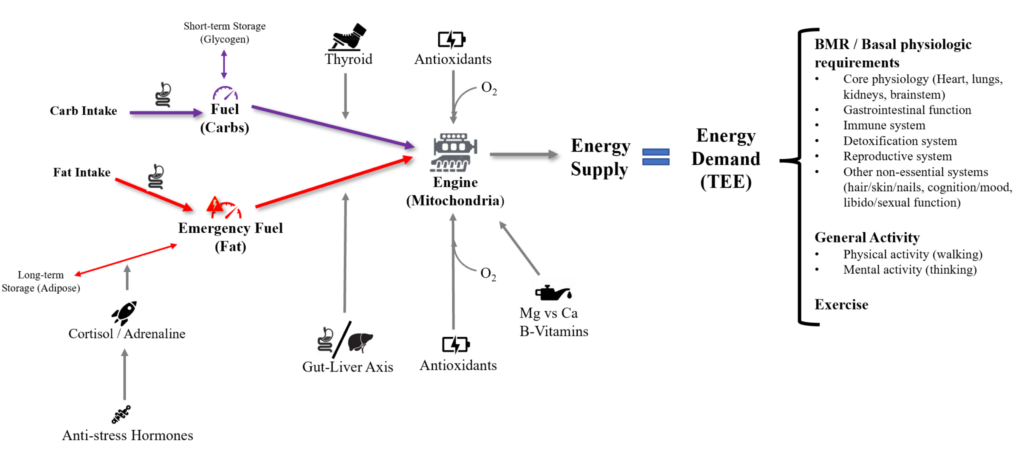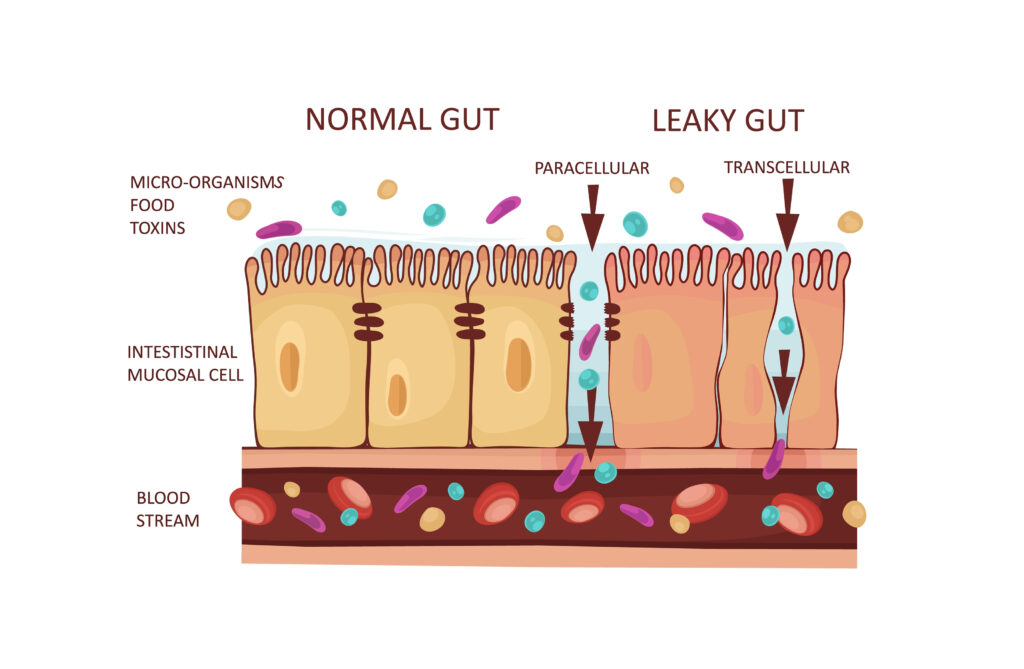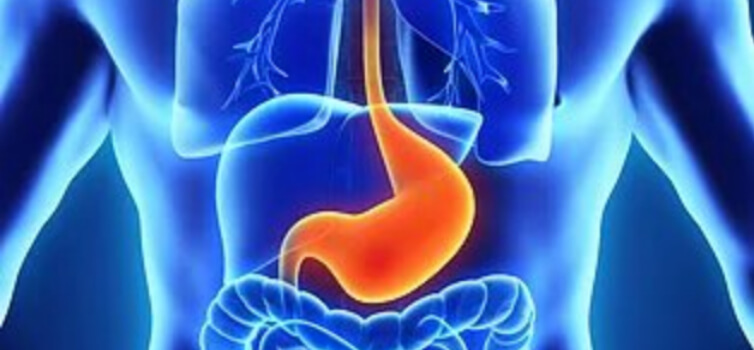“All diseases begin in the gut”
– Hippocrates
The function of the gastrointestinal system is intricately connected to the function of all the other organ systems in the body. Although we typically do not realize it, the gut is where you come into contact with the outside world. We typically think of this role as reserved for the skin, but the gut has a much larger surface area that is exposed to the outside world. Not only that, but the gut has a much harder job than the skin because it must not only keep harmful pathogens and toxins out of the body, but also allow for food to enter. In our bioenergetic model, the gastrointestinal system represents the fuel intake system. If an organism cannot extract nutrients from food and assimilate them into the body, it will be unable to function properly. In other words, even if one consumes a perfect diet, one needs to also digest and absorb the macro- and micronutrients to avoid becoming malnourished. The gastrointestinal system also functions as a barrier that prevents pathogens, toxins, and undigested peptides from gaining access to the body. The gastrointestinal tract also has a profound impact on the immune system and maintains an important functional relationship with the hepatobiliary system (referred to as the Gut-Liver Axis).

There are several functions of the gastrointestinal system that are vital to the entire body’s metabolic process:
- Digestion
- Gastrointestinal Microbiome (aka Flora)
- Inflammation
- Immune System Regulation
- Barrier Function
Digestion
Digestion is the process by which food is broken down into its smallest units in preparation to be absorbed. The first problem area may be the stomach. The stomach has various enzymes that break down food, but what is unique about the stomach is that these enzymes only work in an acidic environment. Think of the stomach as a furnace and acid as the fire. When you throw something in the furnace, it is reduced to ash, but only if the fire is sufficient. While it may seem counterintuitive, one of the biggest issues with digestion is not enough acid. Food then leaves the stomach and enters the small intestine where food is further broken down by pancreatic enzymes. A deficiency of these enzymes is also a major contributor to digestive dysfunction.
Gastrointestinal Microbiome (aka Flora)
The gastrointestinal system is filled with billions of bacteria. We actually contain more bacteria in our gut than we do human cells in our entire body! There is a naturally-occurring balance between good and bad bacteria in your gut. The “good” bacteria have many important functions, such as helping with digestion, regulating the immune system, decreasing inflammation, and helping to produce certain vitamins and nutrients. The term “gastrointestinal dysbiosis” refers to when bad bacteria, yeast, or parasites overcolonize the gastrointestinal tract. There are a multitude of causes for gastrointestinal dysbiosis, including: overuse of antibiotics, poor immunity, heavy metal toxicity, psychological stress, food and inhalant allergies, low stomach acid and poor digestion, nutrient deficiencies, excess consumption of sugar or alcohol, fiber deficiency, adrenal fatigue, oral hormones (including birth control pill and hormone replacement therapy), hormone imbalance, and use of systemic steroids.
Inflammation
Inflammation is essentially tissue damage, which can occur in response to a physical, chemical, or microbial insult. Gastroenteritis is an inflammation of the intestines, usually in response to a virus. Inflammation that occurs with a viral illness; however, is beneficial to the body because it allows the body to get rid of damaged cells and grow new healthy tissue. However, when there are chronic issues in the gut (such as food sensitivities or abnormal gut flora) and inflammation is constant, it will continue to damage the tissue and lead to more and more problems. If the gastrointestinal tract is inflamed, then it will not be able to absorb nutrients properly and the body will develop nutritional deficiencies. Additionally, gastrointestinal inflammation invariably leads to systemic inflammation. Even though you may feel it in your joints, your back, your heart, or your brain, inflammation frequently comes from the gut.
Immune system regulation
About 70% of the body’s immune system is located in the gut. The reason for this is because it is essential that the body deal with any pathogens in the gut, so they don’t enter the body. When the gastrointestinal system is damaged or inflamed, the body will have to use even more energy and resources to maintain a healthy gut and immune system. Over time as the body’s resources become depleted, the gastrointestinal immune system will begin to malfunction, and subsequently the entire body’s immune system will malfunction. The result is frequent illness, asthma, eczema, and allergies. When the gastrointestinal immune system is dysfunctional one of the possible consequences is food sensitivities, which is when the immune system overreacts to a certain food and causes damage.
Barrier Function and Oral Tolerance
The gut is the location where your body comes into contact with the outside world. It is vital that this barrier be maintained for proper health. If this barrier is not maintained, or in other words becomes porous, then it is possible for undigested food to get into the bloodstream. This phenomenon is known gastrointestinal hyperpermeability or leaky gut syndrome. When this happens the immune system does not recognize it as food, but instead as a foreign invader and the immune system subsequently attacks it. The ability of our body to only attack pathogens and not attack food is called oral tolerance and is essential for optimal gastrointestinal and overall health. Sometimes different parts of the body are chemically similar to one of these undigested molecules. When this happens, the immune system will then attack that organ, which leads to a type of disease called an autoimmune disease.

There are various signs and symptoms that you may be having gastrointestinal dysfunction. These may include bloating, gas, constipation, diarrhea, acid reflux, light or pale stools, or floating stools. However, even if you have none of these symptoms, your GI system may still be dysfunctional and be contributing to your other, appearingly unrelated symptoms. Some of the most common ailments that most frequently are caused by gastrointestinal dysfunction include skin problems, fibromyalgia, migratory joint issues, fatigue, anxiety, asthma, and autoimmune diseases such as Hashimoto’s thyroiditis and Rheumatoid Arthritis.
How do I treat gastrointestinal dysfunction?
Your Functional Medicine provider will formulate a customized treatment plan for your particular imbalances. In general, treatment involves the “4 R approach”
- Remove/Reduce. Remove gastrointestinal irritants such as allergenic foods, alcohol, gluten, NSAIDs, sugar, refined carbohydrates, or any other toxins. Your doctor may also instruct you about using antimicrobials to eliminate harmful organisms.
- Replace. Support digestion by adding missing digestive factors, such as digestive enzymes, bile salts, or stomach acid.
- Reinoculate. The gastrointestinal tract needs to be re-colonized with healthy bacteria, which is done through the use of probiotics and/or prebiotics, which are then used by healthy bacteria for nutrition. The best probiotics have the most number of organisms and the most different types of organisms.
- Repair. Often the mucosal barrier of the gastrointestinal tract needs to be repaired, and a variety of specific nutrients and phytonutrients are available.
Consult with a Functional Medicine practitioner to learn if gastrointestinal dysfunction could be contributing to your symptoms.

